

“From Memphis to Madison” rally echoes MLK’s march for workers

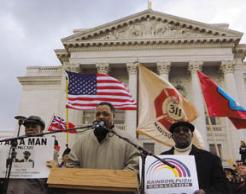
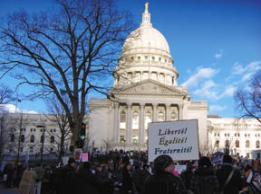
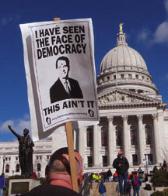

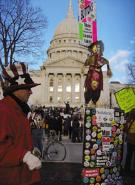
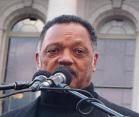
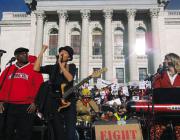
Rev. Jesse Jackson (left and above) led the "From Memphis to
Madison" rally at the Wisconsin Capitol on April 4, to commemorate
the assassination of Martin Luther King, Jr. while protesting for the
rights of Memphis' sanitation workers.
Madison" rally at the Wisconsin Capitol on April 4, to commemorate
the assassination of Martin Luther King, Jr. while protesting for the
rights of Memphis' sanitation workers.
By Heidi M. Pascual
Madison, Wisconsin --Thousands upon thousands of people
marched to the Wisconsin State Capitol with the Rev. Jesse
Jackson on Monday, April 4, 2011, to continue the fight that
Martin Luther King Jr. died for -- workers’ rights, 43 years ago.
In commemoration of King’s assassination in Memphis,
Jackson chose to join Wisconsinites and their supporters all
over the nation at this huge rally, which was part of an ongoing
series of demonstrations against Wisconsin’s Governor Scott
Walker’s Budget Bill that sought to obliterate collective
bargaining rights of state and other government employees.
The Reverend was also with Wisconsinites when the pro-
labor rallies started more than a month ago. Since then, the
Madison, Wisconsin --Thousands upon thousands of people
marched to the Wisconsin State Capitol with the Rev. Jesse
Jackson on Monday, April 4, 2011, to continue the fight that
Martin Luther King Jr. died for -- workers’ rights, 43 years ago.
In commemoration of King’s assassination in Memphis,
Jackson chose to join Wisconsinites and their supporters all
over the nation at this huge rally, which was part of an ongoing
series of demonstrations against Wisconsin’s Governor Scott
Walker’s Budget Bill that sought to obliterate collective
bargaining rights of state and other government employees.
The Reverend was also with Wisconsinites when the pro-
labor rallies started more than a month ago. Since then, the
nation’s activists and progressives have been coming to Madison as the struggle continues every day, getting more and
more supporters as other issues affecting people’s lives – apart from union rights -- come to light. Jackson was simply
inspired to share his real-life-experience with King before and on the day he died, to the demonstrators at the Capitol on
this windy and very cold spring afternoon. Obviously, Wisconsin has become a continuation of King’s march for workers’
rights
At the outset, Jackson reminisced what transpired in Memphis while King was to lead a march for the rights of sanitation
workers. He then invited to join him on the stage two sanitation workers who marched in Memphis with King and Jackson in
1968, Elmore Nickleberry and Baxter Richard Leach. With much applause from the crowd, the two retired workers each held
signs that read “I Am a Man” and Rainbow Push Coalition’s “Jobs Now.” “We marched for civil rights and for workplace
rights,” Jackson said. “We marched for social progress and economic progress.” He remembered King led their
discussion at the courtyard (of Lorraine Hotel) about ending war, ending greed, and fighting for justice just before a bullet
hit 39-year old King in the neck.
Jackson told his listeners that after King’s death, America’s democracy which we embrace today is King’s democracy.
“Multiracial democracy, that’s King democracy; multicultural democracy, that’s King democracy; 18-year olds can vote, that’s
King democracy; Christians and Jews and Moslems and Hindus and Sikhs sit side by side, that’s King democracy; stop
war and live in peace, that’s King democracy.”
He asked everyone to join hands, bow their heads and pray silently, to reflect on the America King found, the America he
left, and the America he dreamed of.
Despite the victories of the civil rights movement in the last few decades, it was clear to Jackson that many things are going
wrong. “We gather 43 years later, his dream for us is under attack, states’ rights are expanding more, frontline civil rights
roll; we’re involved in very expensive wars, bankrupting cities, singling teachers, cutting services for education and police
services,” he stressed, pointing blame at corporations that are not paying taxes. “Forty-three years after the assassination
of Dr. King, the states’ rights forces are back, attacking our rights, attacking our ability to organize, our ability to have a voice
in the workplace, our ability to maintain our public services and our public schools. They want to turn back the clock 50
years on civil rights, 75 years on worker rights. And we just can’t let them do it.”
Jackson likewise lamented the economic disparity in our society that results in poverty for the masses of people, the high
incarceration rate of African Americans and Latinos, as well as the ongoing involvement in wars that drain resources of
government. He then encouraged Wisconsinites to get out and vote on April 5. “April 4 was crucifixion,” he said in reference
to King’s assassination. “April 5 is resurrection,” pointing to the polls the next day.
“When we vote, we show the world that one bullet cannot kill a movement,” Jackson said. He led the crowd to chant “Come
Alive, April 5!”
more supporters as other issues affecting people’s lives – apart from union rights -- come to light. Jackson was simply
inspired to share his real-life-experience with King before and on the day he died, to the demonstrators at the Capitol on
this windy and very cold spring afternoon. Obviously, Wisconsin has become a continuation of King’s march for workers’
rights
At the outset, Jackson reminisced what transpired in Memphis while King was to lead a march for the rights of sanitation
workers. He then invited to join him on the stage two sanitation workers who marched in Memphis with King and Jackson in
1968, Elmore Nickleberry and Baxter Richard Leach. With much applause from the crowd, the two retired workers each held
signs that read “I Am a Man” and Rainbow Push Coalition’s “Jobs Now.” “We marched for civil rights and for workplace
rights,” Jackson said. “We marched for social progress and economic progress.” He remembered King led their
discussion at the courtyard (of Lorraine Hotel) about ending war, ending greed, and fighting for justice just before a bullet
hit 39-year old King in the neck.
Jackson told his listeners that after King’s death, America’s democracy which we embrace today is King’s democracy.
“Multiracial democracy, that’s King democracy; multicultural democracy, that’s King democracy; 18-year olds can vote, that’s
King democracy; Christians and Jews and Moslems and Hindus and Sikhs sit side by side, that’s King democracy; stop
war and live in peace, that’s King democracy.”
He asked everyone to join hands, bow their heads and pray silently, to reflect on the America King found, the America he
left, and the America he dreamed of.
Despite the victories of the civil rights movement in the last few decades, it was clear to Jackson that many things are going
wrong. “We gather 43 years later, his dream for us is under attack, states’ rights are expanding more, frontline civil rights
roll; we’re involved in very expensive wars, bankrupting cities, singling teachers, cutting services for education and police
services,” he stressed, pointing blame at corporations that are not paying taxes. “Forty-three years after the assassination
of Dr. King, the states’ rights forces are back, attacking our rights, attacking our ability to organize, our ability to have a voice
in the workplace, our ability to maintain our public services and our public schools. They want to turn back the clock 50
years on civil rights, 75 years on worker rights. And we just can’t let them do it.”
Jackson likewise lamented the economic disparity in our society that results in poverty for the masses of people, the high
incarceration rate of African Americans and Latinos, as well as the ongoing involvement in wars that drain resources of
government. He then encouraged Wisconsinites to get out and vote on April 5. “April 4 was crucifixion,” he said in reference
to King’s assassination. “April 5 is resurrection,” pointing to the polls the next day.
“When we vote, we show the world that one bullet cannot kill a movement,” Jackson said. He led the crowd to chant “Come
Alive, April 5!”

